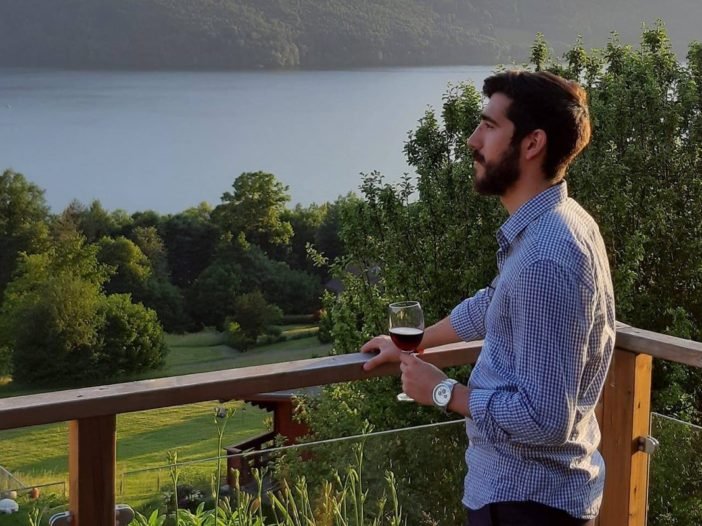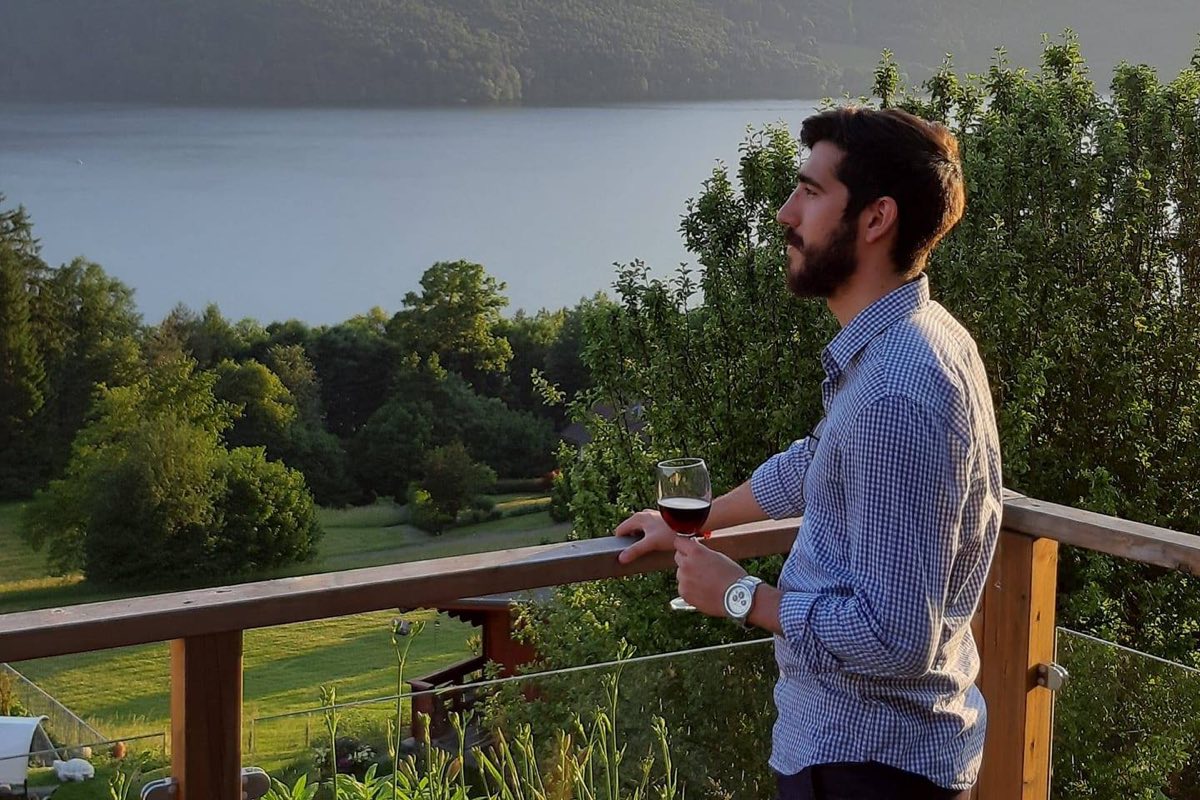
“We all have far more potential than we give ourselves credit for.”
Carlos Garza, better known as “Gago”, is the founder of Wine Wonders GmbH. Wine Wonders was founded at the beginning of 2020, and is a high quality wine distributor working with small family producers throughout Germany on a B2B and B2C basis. The family producers they work with use traditional and “low intervention” methods to create organic or biodynamic wines while also respecting nature. Gago’s long term vision is to build an international wine distribution ecosystem across Europe.
Gago is Mexican, has been based in Munich since 2016. He has a Bachelor’s Degree in International Marketing from the University of Monterrey, and a Master’s Degree in Consumer Affairs from the Technical University of Munich.
As well as running Wine Wonders, Gago is building a social project that offers motivated young students international experience by bringing them to Germany.
Could you tell us about the company you created and/or the professional services you offer?
Sure, Wine Wonders is a company that specializes in the commercialization of high quality wines from countries with a long wine tradition but lesser-known worldwide. We started the project with Hungarian wines, because they’re a clear example of what we’re looking for – spectacular, complex wines with intense flavors that are little-known – and I have a personal connection to Hungarian culture and products having lived in the country as a student years ago. The project will continue incorporating wines from other countries with similar profiles – including Mexican wines – in a couple of years, as the company is solid. We’re also going to offer some complementary products to cover the market for gifts, which currently has great potential.
What did you do before starting your own project?
I worked full-time in international sales within the beer industry here in Germany both during and after my master’s degree. Previously, I worked in marketing in Mexico in different industries – again both during and after my university studies.
What motivated you to take the big step?
Weirdly, one of the main motivations to start a personal project is the dissatisfaction generated by a situation that you can not control and the need to change that. In other words, generally not being happy in your job. Even though I was always concerned to start a company – even starting my first entrepreneurial project in Mexico in the already profitable real estate sector, and only abandoning it because my destiny was on another continent – the comfort of graduating and having a good job in Germany made me stop desperately pursuing other dreams. It was only when an administrative change in the company had bad results that I began to be demoralized. All the non-Germans were fired, and the working environment changed from a friendly, constructive, motivating and respectful one to one in which every new sale we made was not a cause for celebration, but just us fulfilling our obligation. It changed from a culture of collaboration to one of always looking for someone to blame when things went wrong. My sales kept going up, but the efforts of other people to minimize my achievements did too, so that’s when I realized I had to make the decision to search for a new job or undertake a personal project and get my motivation back. I decided to create my own company. Would I have preferred to start my business under different circumstances? Definitely! But it would have taken me longer to make the decision had I been comfortable.
What tools or skills were the most useful for planning the start of your project?
Take lessons from previous work experiences. Many people only go to work to work and get paid, and that’s OK, but I consider it essential to learn a little about all the operational aspects of the company, even when they’re not your direct responsibility. I’m not talking about deviating from your responsibilities, but knowing how the other areas of a company work will help you do your job better and also learn things that will be useful later on in personal projects. In my case, I was assigned new responsibilities last year when I was put in charge of e-commerce activities. That was a huge help to me, because I saw the potential of this channel, and also because there was no one to explain things to me, so I had to learn everything by myself by reading articles and watching YouTube videos. I think there’s a lot of information available and a lot of things you can learn by watching other people’s videos and their testimonies.
Which were the main economic challenges you faced during your project?
In my experience of having seen some startups fail, I can say that the key is to minimize unnecessary expenses in order to lengthen the time before you consume the entire initial capital and have to generate income. It’s a huge mistake to start a project with your own capital or investment and assign yourself a high salary when your project is far from being able to pay it. In my case, Wine Wonders is currently my side job. I don’t receive a salary and all the profits are reinvested in the company. For us, the only expense other than those of legalizing the company and purchasing office equipment, and some other essential expenses of design and marketing, is the raw material, the wines. The key in many cases is not to commit to amounts that you won’t be able to get rid of in, say, half a year. It’s important to have a good control of cash flow to minimize the risk of going offline. Having said that, it’s important to have saved enough money to have an initial capital that allows you to operate for at least one or two years.
How did you get your first customer?
With all startups, your first clients are usually friends, family or acquaintances and then gradually the word spreads. This will happen with or without huge effort on your part, but the most important thing is to attract “organic” customers. To do this, you need to work hard and get the right mix in your communications. That is, a good website – that’s optimized for search engines – and a social media presence. For us, the first organic sale came three weeks after the launch. We still have a long way to go, but in the B2B area, I went to visit some bars and became friends with the owners, who decided to give the wines a chance.
What was the role of your support network, mentors or sponsors at the start of your project?
It’s important to know about the people around you and take advantage of your network. I received a lot of support from my girlfriend for the formalities of the company, since an infinite number of documents with complicated terminology have to be filled in – something which is extremely difficult to do correctly if you do not master the language. So she saved me a lot of time. Also, the partner of the old company where I worked put me in touch with his notary, who’s a really trustworthy person. So I think it’s important that you ask for help, and you’ll find a lot of people willing to give it, especially if they were ever in your shoes.
What is one habit of yours that makes you more productive as an entrepreneur?
In my opinion, the most useful habit, and one that not many people notice, is curiosity – seeking to discover and try new things that you didn’t know about and trying to incorporate or implement practices into your life or work to improve yourself.
Is there a book, series or podcast that you’re particularly into right now?
I don’t actively listen to podcasts, although I think I might find some entrepreneurship helpful. Books I try to read in my free time or when I go to work on public transport. I like psychotherapy books, like Man’s Search for Meaning by Viktor Frankl, or self-help or psychology, like Malcolm Gladwell’s The Tipping Point.
Is there anything else you would like to share with our readers?
I would say if you have an idea and you believe in it, look for a way to do it. Follow your instinct, Yes, it is very important to always keep taking small steps. There will be many times when you don’t know where to start. The important thing is to do just that – start. Things don’t always have to be perfect. At first, they just have to come out. And as time goes by, you’ll become an expert. It is important to do one little thing every day that brings you closer to your dream – be it making call, sending an email, or writing a list or a plan. Once you’re on track, it’s even more important to have short-term goals in order to stay motivated. You can have the end goal or clear final objective, but you need a few other objectives to make the path shorter and be able to enjoy the small victories. Every time you achieve something, however small it is, celebrate it and recognize the effort it cost you.


Leave a Reply